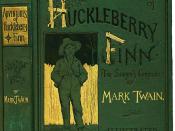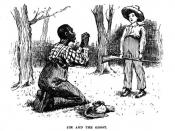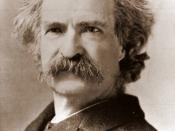The Adventures of Huckleberry Finn, a seemingly innocent children's novel, is actually a powerful satire on American institutions that was meant for adults as much as for children. It tells the story of a young, derelict boy who travels down the Mississippi River with a runaway slave, Jim. Throughout the novel, he is forced to make many important decisions that conflict with the current American beliefs and morals. Mark Twain, a literary genius, had strong opinions on many American institutions and cultural aspects. Twain, in choosing to tell The Adventures of Huckleberry Finn from Huck's point of view, was able to satirize many institutions of the time.
Mark Twain was disgusted by American society and its morality concerning racism, and the social class levels associated with it. He represented these issues in the novel by showing the contrast between Tom Sawyer, who is at the highest level of society and Jim, who is at the lowest class and how neither one of them are the ideal level, but instead how a hybrid of the two is the most beneficial.
These levels of society were an imaginary distinction between the members of an American society, much like a caste system, that generalized the characteristics of each citizen. Jim, the lowest level of society, had superstitious, nonfactual beliefs, that were often formed by coincidence. This can be seen at the beginning of the novel when Jim creates the story that he was entranced by witches and paraded about the town, in order to explain the simple occurrence of his hat being moved while he was sleeping. Jim claims that the five cent piece Tom left for him, in exchange for a candle was a good luck charm. Mark Twain displays Jim's superstitious beliefs when Huck Says: "Jim always kept that...


